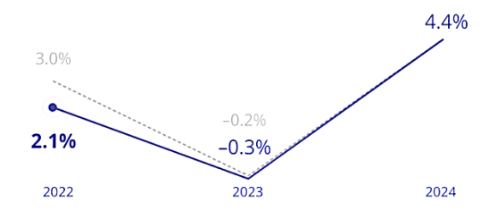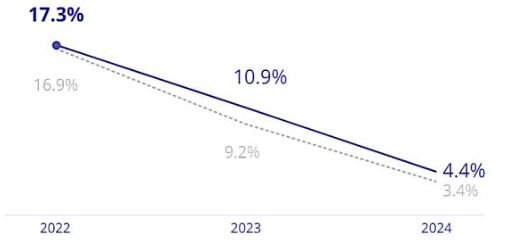Weekly Briefing, Vol. 58. No. 2 (LVA) January 2023
Outlook for 2023: Latvian Economy and State Budget Priorities
Summary
The year 2023 will be affected by recession in the Latvian economy. According to the latest forecasts of the Bank of Latvia, inflation could remain at 10.9% in 2023, and a -0.3% decrease in GDP could also be observed. When the prices of energy resources normalize, it is believed that the inflation rates will stabilize as well. Also, an important event in the economy in 2023 will be the adoption of the annual state budget. The greatest emphasis in the national budget will be on national security and foreign policy, education, energy, climate and environment, the competitiveness of the national economy in the world and the quality of life of the population. In 2023, the Latvian economy will continue to develop in the conditions of uncertainty and the tense geopolitical situation.
Introduction
The guiding principle of this government’s work for 2023 in the economy is economic transformation, and therefore the next year’s budget will also focus on it. To effectively implement the necessary reforms and achieve the set goals, it is important that the country and citizens are safe, to promote and expand the educational opportunities of our society, as well as the availability of health care services and the well-being of the population, along with innovations. To be able to implement economic transformation in the coming years, according to the government’s declaration, the most important priorities are national security and foreign policy, education, energy, climate and environment, competitiveness, and quality of life. After extensive discussions by the government coalition on the priority measures proposals submitted by the sectoral ministries, the 2023 state budget proposes to implement such priority measures that will ensure balanced achievement of the goals included in the government declaration.
Macroeconomic Indicator Forecasts
The base scenario of the forecasts is a short-term and shallow recession in the Latvian economy. As visible in Figure 1, in 2023, the development is expected to be like the previously forecast -0.3% (-0.2% was forecast in September 2022).
Figure 1. GDP Forecast for the Latvian Economy

Source: Bank of Latvia
At the same time as the slight drop in the gross domestic product (GDP), a more significant decline in household consumption is expected – by 5.6%. The decrease in purchasing power will negatively affect the level of well-being of the population.
Figure 2. Inflation Forecast of the Latvian Economy

Source: Bank of Latvia
Inflation remains high, and in the forecasts of the Bank of Latvia, the assumptions about the increase in global food prices and the increase in domestic wages have been increased. This led to an increase in the inflation forecast – the forecast for 2023 – 10.9%. In September, it was 9.2%.
Inflation in Latvia will decrease as energy prices normalize. However, global food price increases and wage increases could be higher and sustain higher inflation than previously estimated. Government support stabilizes the purchasing power of households and (especially measures to curb the increase in energy prices) slows down inflation. High inflation is determined by a significant increase in both energy and food prices. A successful restructuring of the supply of energy resources will also reduce the pressure of energy prices in the national economy, although energy prices will most likely be higher than before the crisis.
In the Latvian economy, the beginning of this year is marked by a recession, but the recession is expected to be short-lived and shallow. The recession of the national economy will be determined by the decline in the purchasing power of households, as the increase in wages significantly lags inflation. This will not be fully offset by government support and savings, so household welfare will be adversely affected.
State Budget
The prepared proposal for the 2023 state budget will be submitted to the government for consideration by the Minister of Finance. The offer envisages financing new government programs and priorities in the amount of 710 million euros in addition to the existing state programs.
For the implementation of additional measures in 2023, funds from the fiscal space in the amount of 215 million euros have been earmarked. Financial resources redistributed in the budget execution process and additional contributions to the state budget from state capital companies have also been used as the necessary financial resources, providing the necessary financing in the amount of 141 million euros. It should be noted that this funding is a redistribution within the budget and does not create an additional deficit or impact on the approved fiscal space. Similarly, 354 million euros have been earmarked for state priorities and other institutions outside the fiscal space for one-time investments to strengthen state security services and capabilities.
When preparing the budget proposal, the government allocated significant funding for strengthening national security, where funding was basically supported for one-off measures that can be financed outside the fiscal space. This important security position provides funding not only for the Ministry of Defence and the Ministry of the Interior, but also for the purchase of critical equipment for public media. This will ensure the continuity and mobility of television signals, which is the basis for informing the public about what is happening in the country.
Funding for the purchase of air defence systems will be provided annually, ensuring the safety of citizens in the current difficult geopolitical conditions. The infrastructure of the internal affairs system will also be strengthened by purchasing new firefighting vehicles and building the disaster centres of the State Fire and Rescue Service depot. The Ministry of the Interior has developed an offer that ensures regional coverage with modernized crisis centres throughout the territory of Latvia.
In 2023, the minimum income level will be increased, further linking it to socio-economic indicators.
This year is the 150th anniversary of the Latvian Song and Dance Festival, so in the year of the anniversary, the government has agreed on additional funding for the successful running of the festival. Also, a solution has been found for the growth and predictability of funding of the Culture Capital Fund, linking it to tax revenues.
At the same time, the state’s priorities are investments in our people and strengthening competitiveness, channelling significant funding to science, research, and higher education. Continuing targeted support for health promotion, additional funding has been allocated to the availability of health care services in the field of oncology, including innovative medicines, as well as the availability of services for children.
Funding is planned for strengthening the capacity of the state administration, ensuring the remuneration of strategically important job groups. The Government has also supported additional funding to strengthen the capacity of judicial staff and the performance of the Business Register.
To implement the priorities announced by the sectors in 2023, 166.8 million euros are earmarked, a third of which is for health measures, increasing the salaries of medical personnel and the availability of health services to the population. On the other hand, to ensure support for the rural development policy, in the implementation of the common agricultural policy, in the medium term, significant funding will be provided for the achievement of strategic goals.
This year, the Ministry of Transport is expected to allocate substantial funding to cover public transport losses, while at the same time it is tasked to work on reducing losses and stabilizing the financial situation of Latvian Railways. An agreement has also been reached to allocate substantial funding for the reconstruction and renovation of the country’s regional and local highways both in 2023 and in the medium term.
The implementation of additional demography measures will be ensured both by the Society Integration Fund, which will have to administer several family support programs, implementing projects in cooperation with non-governmental organizations in accordance with the requirements set out in the regulatory acts, and by the Ministry of Economy, which will supervise the housing program.
Conclusions
2023 will be a year of high uncertainty and present complex and changing circumstances. Positive developments will be more related to the non-realization of negative risks. Significant risks of inflation, energy supply and new geopolitical upheavals will remain. The year 2023 promises to be full of challenges for the economy of Latvia, Europe, and the whole world. From approaching recession, complications in several business sectors and the risk of depleting natural gas reserves, to more positive scenarios where we can expect food price deflation and higher wages. The measures already included in the state budget – increase in the salary of teachers, raising the minimum wage, state support for citizens to compensate for the increase in energy prices, support for Ukraine – and the additional measures proposed in the 2023 state budget project in the amount of 710 million euros, as well as the European Union fund investments this year in the amount of at least 1.3 billion euros will ensure a move towards economic transformation and easier overcoming of the possible consequences of economic recession, which in turn might ensure the competitiveness of the national economy and the increase in the well-being of the population.
References
- CBL Asset Management. (2023). CBL Asset Management. https://www.cblam.lv/lv/research/economic/2023/01/106/macro_chartbook_13jan23.pdf
- Ko Latvijas un pasaules ekonomikai nesīs 2023. gads | SEB. (2023, January 2). https://www.seb.lv/info/ekonomiska-vide/ko-latvijas-un-pasaules-ekonomikai-nesis-2023-gads
- Latvijas Banka. (2022). Prognozes. https://www.bank.lv/darbibas-jomas/monetaras-politikas-istenosana/prognozes
- LSM ziņu dienests. (2022, December 16). Latvijas Banka koriģē prognozes: šogad ekonomikas izaugsme sarūk; inflācija kāpj līdz 17,3%. LSM.LV. https://www.lsm.lv/raksts/zinas/ekonomika/latvijas-banka-korige-prognozes-sogad-ekonomikas-izaugsme-saruk-inflacija-kapj-lidz-173.a487324/
- LVportāls. (2023). LV portāls – Cilvēks. Valsts. Likums. https://lvportals.lv/dienaskartiba/348065-2023-gada-valsts-budzeta-galvena-prioritate-drosiba-2023
